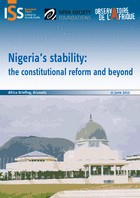You are here
Nigeria’s stability: the constitutional reform and beyond

In recent months, Nigeria has faced a number of challenges to its stability. This briefing will analyse to what extent the already planned constitutional reform could bring substantial change to the country’s political and socio-economic system.
In November 2011, President Goodluck Jonathan announced the inauguration of the ‘Presidential Committee on the Review of Outstanding Constitutional Issues’. If the National Political Reform Conference of 2006 provided the basis for constitutional amendment, the President announced his willingness to further strengthen areas of national consensus and renew the 1999 Nigerian Constitution. The core issues at stake reportedly include: National Security, Human Rights and Social Security, People’s Charter and Social Obligations, Environment and Natural Resources, Models and Structure of Government, Public Service, Power Sharing, Local Government Reforms and the Economy. If centralised federalism is accepted by the different religious and ethnic groups, it should also prove to be an effective tool to set up accountable political structures, ensure economic development, and real political representation.
In January 2012 Nigeria’s government decided to remove the subsidy on fuel, a hugely unpopular economic reform that caused riots, protests and a nationwide strike called by labour unions. The social unrest and frustration created by reforms on fuel subsidies inflamed an already volatile situation in several regions of Nigeria and generated concern over increasing violence and instability. The President has also faced growing criticism on the handling of the situation in the northern states where the Islamic group Boko Haram has emerged as a major security concern.
Although Islamic radicalisation and violence are behind the actions of some groups like Boko Haram, the underlying causes and challenges Nigeria faces are much more complex and mainly related to socio-economic marginalisation and political fragmentation. Indeed, endemic poverty and uneven development within the country, as well as the capacity of individual federal states to manage and/or benefit from the resources found in their respective territories, seem to be the key obstacles in Nigeria’s path to stability.
By gathering experts on Nigerian politics, this Africa Briefing will seek to identify the main challenges of constitutional reform, paying particular attentions to the following issues:
1) The challenges of an effective constitutional reform agenda.
2) The root causes of human insecurity in northern Nigeria and the challenges of setting up state-level security mechanisms.
3) The kind of revenue sharing formula and fiscal federalism structure Nigeria should implement in order to ensure sustainable development.
4) The implications and potential for engagement for external actors including the EU.